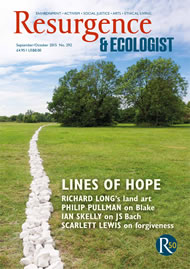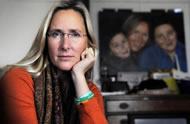My six-year-old son wrote a message on our kitchen chalkboard: “Nurturing Healing Love”. Those three words are not in the normal vernacular of a six-year-old, and were phonetically spelled because he was in first grade and just learning to write, but those three words are among the definitions of compassion across all cultures. My son, Jesse McCord Lewis, died a few days later in the Sandy Hook School shootings, at Newtown, Connecticut, on 14 December 2012.
This prophetic communication leaves a few questions: did he know that he was going to leave us? Where did he get those words? But it answers even more. When you define each word, nurturing means loving kindness and gratitude; healing means forgiveness; and love is compassion in action.
This is the algorithm for choosing love. And this was my response to the brutal death of my precious child. I started the Jesse Lewis Choose Love Foundation to spread this message throughout the world and to advocate social and emotional learning in schools. Yes, I experienced anger at times, but I thought about how much pain someone had to be in to do something so heinous, and I felt more compassion than anything else.
How could something like this have happened? I’ll tell you what I think: anger. I pictured my son’s killer as a little boy, having an angry thought without the tools or nurturing environment to deal with this emotion. We know that one angry thought can change us on a cellular level and that repeated anger changes the wiring in our brain. Imagine what years of unchecked anger does to a mind, body and spirit. This anger eventually escalated into rage, and I believe rage is what fills our prison systems and is what led to the mass shooting at Sandy Hook Elementary. And the most amazing thing is that a thought can be changed!
We each have on average 60,000 thoughts going through our heads every day. When you take a moment to think about what you’re thinking, you may come to realise that the majority of those thoughts are the same ones you had yesterday, the day before, the week before and perhaps even for years. These are most likely thoughts that do not serve you and might even be thoughts of anger. I spoke at Jesse’s funeral and asked everyone to consciously change one angry thought a day into a loving one. “By doing this you will make yourself a better person, you will positively impact those around you, and through the ripple effect you will change the world,” I said. The response I received was overwhelming. This simple act of choosing love changed lives.
Tragedy can be a blessing because you gain an incredible perspective about what is important in life, and the rest falls away. You appreciate what you do have and you don’t sweat the small stuff. Since Jesse’s death I have come to understand that the most important thing in life is love and that we are all here to help one another.
I witnessed this first-hand when orphan survivors of the genocide in Rwanda reached out to my surviving son, JT, who was 12 at the time of the Sandy Hook shootings. They wanted to share their experience with him and let him know that he would be OK and feel joy again. Over Skype and through an interpreter they talked about watching as their family members were hacked to death in front of them. After harrowing escapes they wound up in orphanages and began to feel gratitude for the food they received, the walls that provided security, and the compassion they were shown. They realised that they had to forgive the killers or they would go down the same path of anger and destruction. Forgiving allowed them to step outside their own pain and use the meaning of their suffering to help others, as they were doing for JT.
After this experience JT and I began to count our blessings. We were surrounded by family and friends. We had loving neighbours bringing food to our door every night and we had each other. Together we made the conscious choice to forgive the young man who had murdered Jesse, because we realised we might never be able to move beyond the tragedy if we didn’t.
I saw JT writing in a journal that night and asked him what he was writing. He said: “Those kids reached out to me in love and I’m going to reach back out to them. I’m going to start a fundraising campaign to send them to university.” The next day he returned to school and started his campaign and was able to Skype back to the same group several months later and announce to a woman named Betty that he had raised enough money to send her to university for four years plus an additional amount to help her family during her absence. JT saw how a little effort on his part fundamentally changed another person’s life. He continues to heal through his organisation www.newtownhelpsrwanda.org
I call 14 December the world’s greatest day of compassion. On that day the world came together in the true meaning of compassion, which has two components. The first component of compassion is identifying with someone’s pain. And this can be painful and sometimes we don’t move past this part because it’s uncomfortable. But the second part of compassion is the miraculous part. This is when you actively do something to help ease another’s pain and in doing so get all the energy and love back that you gave out, and more. If we taught our children the benefits they would receive by practising love in action, our world would be a better place.







